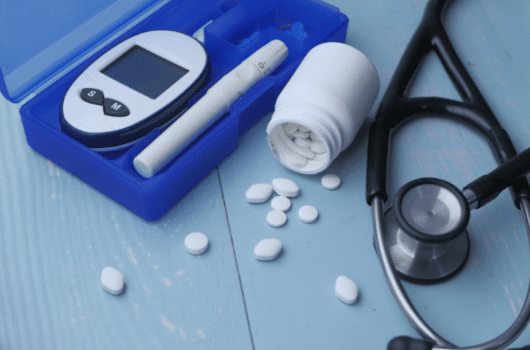
Did you know that it’s possible to put your prediabetes into remission without medication? With Diabetes Day this Sunday, we’re raising awareness about prediabetes and Type 2 diabetes. That’s why this week’s blog is focused on all things blood sugar, healthy living and spotting the early signs and symptoms of diabetes.
What is prediabetes?
When a person has blood sugar that’s higher than normal but lower than the typical Type 2 diabetic range, they’re classified as prediabetic (1). Put simply, prediabetes is the medical term for someone who is at risk of getting Type 2 diabetes because of their blood sugar levels. Prediabetes is usually caused by an unhealthy weight or lifestyle but knowing the risk factors can prevent or even delay up to 50% of Type 2 diabetes cases (1).
What is the blood range for prediabetes?
Since prediabetic symptoms can be so subtle, one of the most effective ways to monitor prediabetes is by checking your blood sugar range. You can visit your GP to get your blood sugar range measured, but the typical range is:
Normal:
Less than 100 milligrams per decilitrePrediabetic:
Between 100-125 milligrams per decilitreDiabetic:
126 milligrams per decilitre or higher (2)
What are the warning signs of prediabetes?
Prediabetes is extremely subtle when it comes to visible symptoms, that’s why it’s always important to get a blood test if you think you might be at risk. Sadly, if you begin to notice clear symptoms, it’s likely that you’ve already progressed to Type 2 diabetes (3).
But don’t worry, there are a few things to be mindful of to help control your blood sugar:
You’re carrying a little extra weight
Staying mindful of your weight and lifestyle is one of the most important things when it comes to preventing prediabetes & Type 2 diabetes (5). Being overweight is the main risk factor for prediabetes and Type 2 diabetes, with adults in England being 5 times more likely to get a diagnosis if they’re overweight (4).
You're noticing changes in your skin
Skin tags and pattern discoloration are both visible symptoms of prediabetes, keep a check on your body to notice any unusual changes and get a blood test if you suspect it could be linked to your blood sugar (5).
You often indulge in sweet and sugary foods
Surrendering to those sweet cravings more often than not? Believe it or not, eating too much refined sugar in your diet can increase your risk of prediabetes, overwhelming the pancreas and even causing weight gain (5).
You prefer the couch to the treadmill
Finding it hard to get motivated at the gym? A lack of exercise could increase your chances of prediabetes (5). But don’t worry, you don’t need to get sweaty to be active! Anything from a short walk to a soothing yoga class is a great way to introduce some low impact movement into your life.
You struggle to sleep at night
Issues with sleeping at night can be linked to increased blood sugar levels and prediabetes (5). If you’re worried this may be the case, visit your GP and get your blood sugar tested.
Am I more at risk of prediabetes because I’m over 40?
Unfortunately, as we age, we become a lot more susceptible to prediabetes and Type 2 diabetes. There are many more risk factors that have been linked to an increased risk of prediabetes, including:
Being over 40
Having a family history of diabetes
Suffering with high blood pressure
Being overweight (3)
Can I reverse my prediabetes?
Great news! It’s possible to put your prediabetes into remission without the need for medication. It’s important to note that, while we can put diabetes into remission, it isn’t technically ‘reversed’, as it can always return if you revert back to an unhealthy lifestyle.
We spoke with Joanne who was able to use exante to put her Type 2 diabetes into remission:
‘I started exante 11 weeks ago to put my diabetes into remission through the health Trust in Northern Ireland and I'm now off all diabetic medication! I started at 20 stone, 10lbs, now I'm down to 16.5 stone so far.
I started following the 800 calorie plan from June and by the end of August, I’d lost over 4 stone! I'm loving the shakes, especially making sugar-free lollies with them.

I also support my diet by drinking 2.5 litres of water a day! I've now successfully put my diabetes into remission, with my blood sugar going from 52 to 35 (which is within the normal range). I currently have a shake for breakfast, a 300 calorie lunch, 400 calorie dinner and a shake at supper. I’ve never felt better!’
How can I put my prediabetes into remission?
Wondering how you can do the same? Luckily, Klinic App have pulled together a list of things you can do to put your prediabetes into remission before it turns to Type 2 diabetes:
Manage your weight
Losing weight is a key component to stopping prediabetes in its tracks (5)! If you’re overweight, we recommend losing the bulk of your weight first then switching up your diet to include a balance of fruit, veg and complex carbs while reducing your sugar intake.
Manage your stress
Managing your stress and finding the root cause of your anxieties is a great way to take control over your blood sugar.
Need help managing your stress? Check out our blog below
Find a diet that suits you
Finding a balanced diet is an important factor when you’re trying to manage your blood sugar levels. You’ll need to:
Increase the fibre in your diet
Increased fibre can slow down the absorption of sugar, improving blood sugar levels (6).
Check out our favourite high fibre products
Cut your sugar intake
While a sugar-rich diet doesn’t actually cause Type 2 diabetes, it can increase your risk of prediabetes because it alters your body’s ability to regulate glucose (7).
Love sweet things but trying to cut sugar? We’ve got you covered.
Check out our low sugar products
Do you suffer from diabetes? We’ve got a 45% discount for any sufferers, click here to find out more.
Feeling inspired to start your own journey? Join our exante community in the exante Facebook Closed Group to give us your thoughts as well as staying in the know with our latest tips, tricks and products!
Excited to share your progress? Be sure to tag @exantediet on Instagram in all your food and transformation pictures!
- Diabetes – NHS (www.nhs.uk)
- Prediabetes: Definition, Symptoms, Causes, Diagnosis, and Treatment (webmd.com)
- Prediabetes | Diabetes UK | Reduce risk type 2 diabetes
- Adult obesity and type 2 diabetes (publishing.service.gov.uk)
- How to Reverse Pre-Diabetes with Diet – Understand (klinicapp.com)
- Dietary fiber: Essential for a healthy diet – Mayo Clinic#
- sugar and diabetes – Bing










